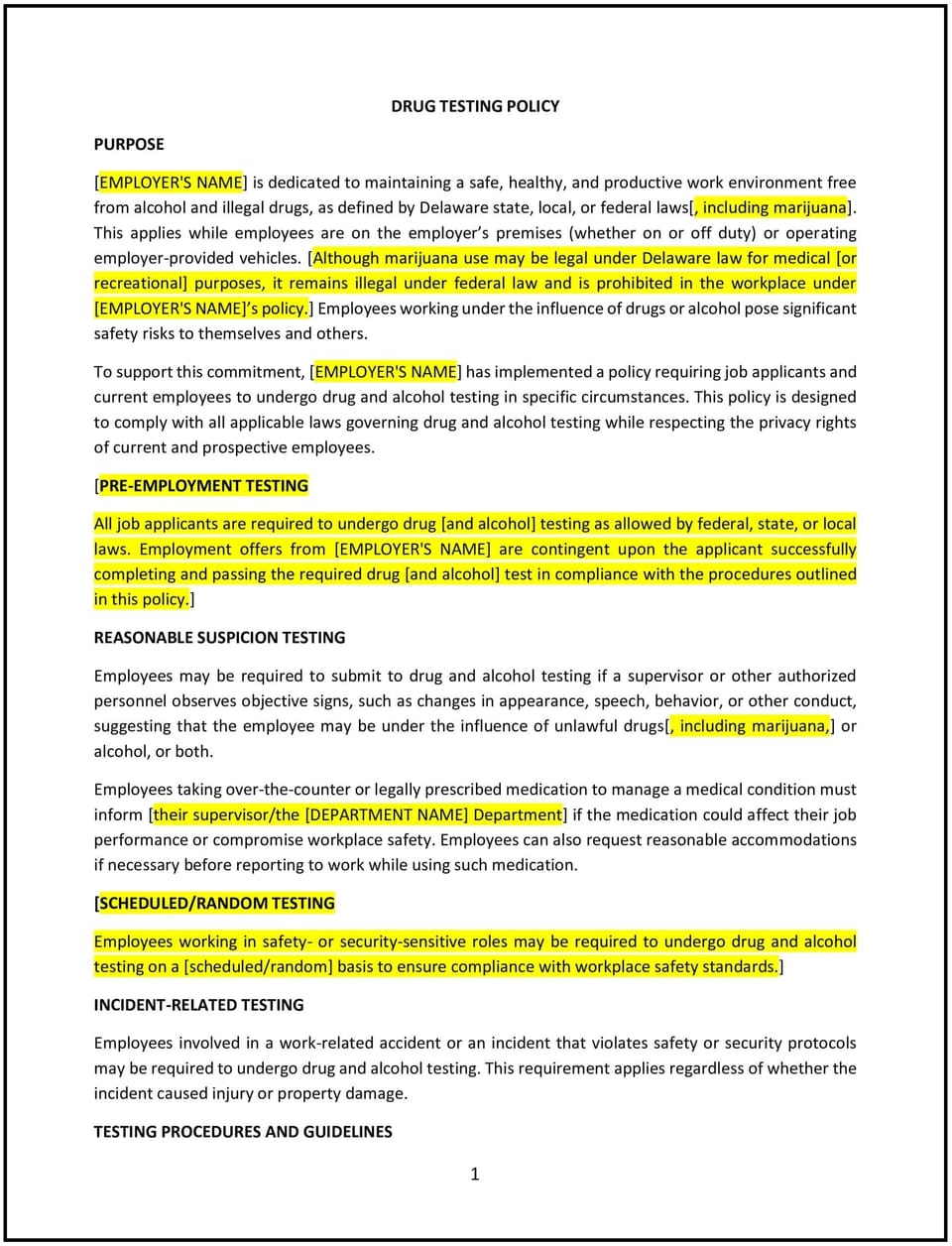Drug testing policy (Delaware): Free template

Drug testing policy (Delaware)
A drug testing policy helps Delaware businesses establish a clear framework for testing employees for substance use in compliance with state and federal laws. This policy outlines when and how drug testing may be conducted, employee rights, and procedures for handling positive test results.
By implementing this policy, businesses can promote workplace safety, ensure compliance, and maintain a productive work environment.
How to use this drug testing policy (Delaware)
- Define testing types: Specify the types of drug tests that may be conducted, such as pre-employment, random, post-accident, or reasonable suspicion testing.
- Establish testing procedures: Outline how drug tests will be conducted, including the methods, locations, and third-party testing providers.
- Communicate employee rights: Ensure employees understand their rights regarding drug testing, including consent and the opportunity to challenge results.
- Address positive results: Provide a clear process for handling positive test results, including retesting options, disciplinary actions, and access to rehabilitation programs if applicable.
- Ensure legal compliance: Align the policy with Delaware and federal laws, such as privacy protections and requirements for specific industries.
- Maintain confidentiality: Emphasize the importance of safeguarding employees’ test results and related information.
Benefits of using this drug testing policy (Delaware)
This policy offers several benefits for Delaware businesses:
- Promotes workplace safety: Helps prevent accidents and injuries by identifying and addressing substance use.
- Ensures legal compliance: Aligns with Delaware and federal regulations, reducing the risk of legal disputes or penalties.
- Enhances productivity: Minimizes the impact of substance use on employee performance and workplace operations.
- Supports employee well-being: Provides access to resources for rehabilitation and encourages a substance-free workplace culture.
- Protects company reputation: Demonstrates the company’s commitment to safety, compliance, and professional standards.
Tips for using this drug testing policy (Delaware)
- Communicate the policy clearly: Ensure employees are aware of testing requirements, procedures, and their rights under the policy.
- Provide training: Educate managers and supervisors on recognizing signs of substance use and handling testing procedures appropriately.
- Use certified providers: Partner with accredited testing facilities to ensure accurate and reliable results.
- Offer support: Provide resources, such as employee assistance programs (EAPs), to help employees address substance-related issues.
- Review regularly: Update the policy periodically to reflect changes in Delaware laws, industry regulations, or workplace needs.
Q: Why is a drug testing policy important for my business?
A: This policy promotes workplace safety, ensures compliance with Delaware and federal laws, and supports a productive and substance-free work environment.
Q: What types of drug testing are typically included in this policy?
A: Common types include pre-employment, random, post-accident, reasonable suspicion, and follow-up testing for employees in rehabilitation programs.
Q: How does the policy protect employee rights?
A: The policy requires employee consent for testing, provides the option to challenge results, and ensures confidentiality of all test-related information.
Q: What happens if an employee tests positive?
A: The policy outlines steps for addressing positive results, which may include retesting, disciplinary actions, or access to rehabilitation resources, depending on the circumstances.
Q: How often should this policy be reviewed?
A: This policy should be reviewed annually or whenever Delaware laws, industry standards, or company practices change to ensure continued compliance and effectiveness.
This article contains general legal information and does not contain legal advice. Cobrief is not a law firm or a substitute for an attorney or law firm. The law is complex and changes often. For legal advice, please ask a lawyer.


